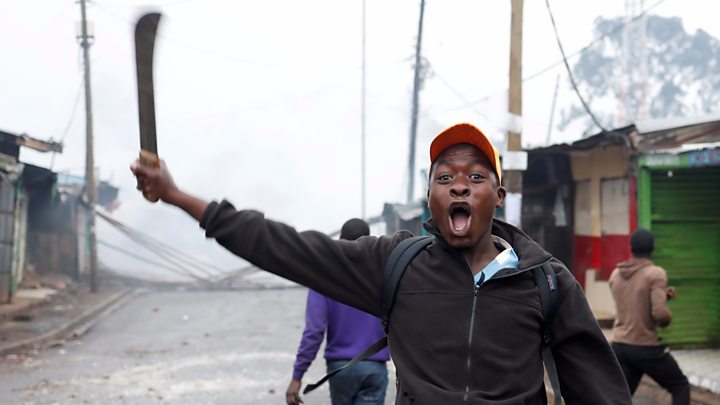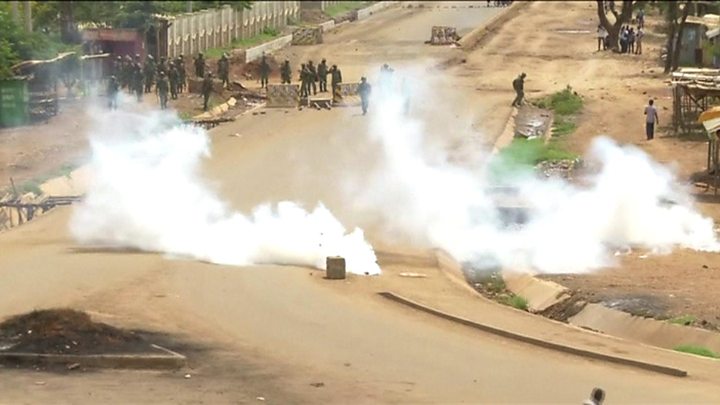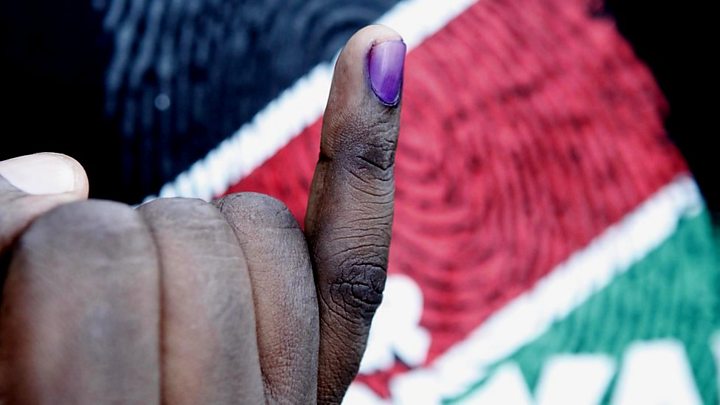Kenya election: Voting begins in re-run amid tightened security
Voting is under way in Kenya amid tight security in a re-run of the presidential election, which is being boycotted by the main opposition.
Police have clashed with opposition supporters, some of whom have been blocking access to polling stations.
President Uhuru Kenyatta was declared the winner in an August vote, but it is being held again over "irregularities".
The BBC's Alastair Leithead in Nairobi says turnout so far appears to be much lower than the first time around.
Mr Kenyatta is seeking a second term. Opposition leader Raila Odinga has pulled out of the contest.
- Live updates: Kenya's controversial vote
- Kenya needs healing
- Key moment for African democracy
The polls on Thursday opened at 06:00 (03:00 GMT) with tens of thousands of police and other security staff deployed to protect voters and polling stations.
International observers have scaled down their missions for security reasons.
Unconfirmed reports say police have fired live rounds into the air to disperse opposition supporters in the western city of Kisumu and the Kibera area of Nairobi. Tear gas has also been used.
A voting official in Kisumu – opposition leader Raila Odinga's home town – told the BBC just two of 400 polling station officials had turned up there, fearing they could face intimidation for taking part in the election.
 Media playback is unsupported on your device
Media playback is unsupported on your deviceOne voter in Nairobi's Mathare slum, taxi driver David Njeru, 26, told the AFP news agency: "It is my duty to vote. Last time the queue was all around the block and I waited six hours to vote, this time the people are few."
- Uhuru Kenyatta: Kenya's 'digital president'
- Raila Odinga – love him or loathe him
- Full election coverage
After casting his vote in the town of Gatundu, Mr Kenyatta urged people to cast their ballots so the country could move on.
"We're tired as a country of electioneering. It's time we moved forward," he said.
He said most of Kenya was "calm and peaceful"
Voting under armed guard
Analysis: BBC Africa Editor Fergal Keane in Nairobi
Here at Moi primary school a small queue of people is lining up to vote under strict security. Armed police are on guard although this is an area some distance from any opposition strongholds.
But in opposition strongholds like Kisumu there are reports of empty polling stations and election officials too fearful to turn up for work. Some teargas has been fired at demonstrators in the Nairobi settlement of Kibera.
Western diplomats have called for calm and negotiations and condemned what they said were efforts to undermine the election commission and the judiciary. Though they don't say it outright, the US and UK ambassadors and others don't appear to have great confidence in this current electoral process.
What has happened since the first vote?
The announcement by the Independent Electoral and Boundaries Commission (IEBC) of Mr Kenyatta's victory on 8 August led to inflammatory rhetoric and attacks on the body.
Last week, a senior member of the IEBC fled to the US amid death threats.
 Media playback is unsupported on your device
Media playback is unsupported on your deviceAbout 50 people are reported to have been killed in violence since Mr Kenyatta was declared the winner in August's election.
Mr Odinga had wanted the repeat ballot to be held at a later date, but a bid to delay the election re-run fell apart after only two of seven Supreme Court judges attended a hearing on Wednesday.
One judge, Deputy Chief Justice Philomena Mwilu, failed to appear after her bodyguard was shot and wounded by unknown gunmen on Tuesday.
What went wrong in August?
Kenya's Supreme Court took the unprecedented decision to annul the August presidential election and demand a re-run in September citing "irregularities and illegalities".
Chief Justice David Maraga said the election had not been "conducted in accordance with the constitution" and declared it "invalid, null and void".
He said the verdict, which was backed by four of the six Supreme Court judges, found that the IECB had committed irregularities "in the transmission of results".
The court said the result was "neither transparent nor verifiable".
The ruling did not attribute any blame to President Kenyatta's party or campaign but it nevertheless raised tensions, with rival protests in support of and against the court.
There were running battles between police firing tear gas and stone-throwing protesters in the city of Kisumu, an opposition stronghold, on Wednesday.
Why is the opposition boycotting?
Mr Odinga has said that the IECB failed to make the changes needed to prevent a repeat of the mistakes that marred the earlier poll, although the IECB disputes this.
His opposition coalition – the National Super Alliance (Nasa) – made clear its participation in the election was contingent on reforms being made.
Mr Odinga had vowed to disrupt Thursday's vote, calling for "massive" demonstrations, but has asked his supporters to stay away from polling stations in an attempt to avoid violent clashes.
In a statement earlier this month, he accused the government of instituting a "dictatorship", adding: "We are going to win the battle for a free and fair election".
"Our opponents want an election for the sake of it, we want a better election," he said.

